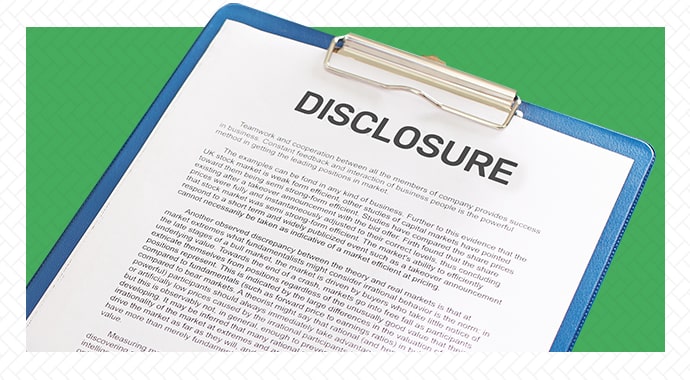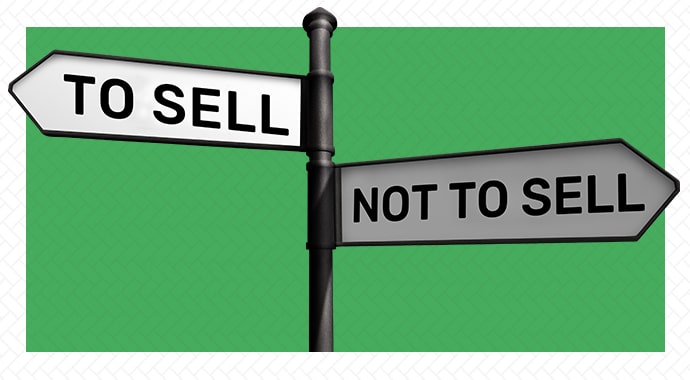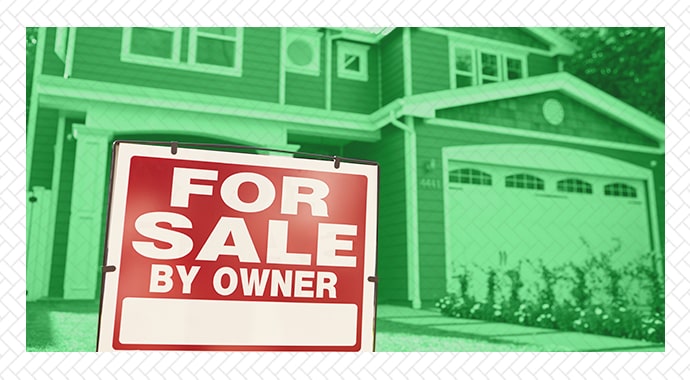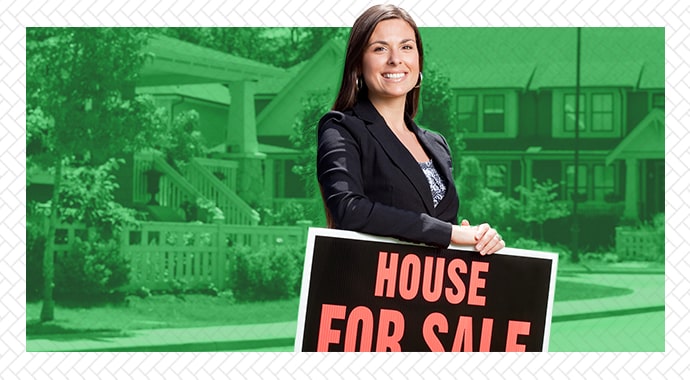Selling a Home As Is in Louisiana (A-to-Z Guide)
Even though the information on this web page is provided by a qualified industry expert, it should not be considered as legal, tax, financial or investment advice. Since every individual’s situation is unique, a qualified professional should be consulted before making financial decisions.
This guide gives you all the details you need to know to accomplish selling your home ‘as is’ in Louisiana.
We’ll define the term ‘as is,” outline the legal demands of the disclosure statement, weigh the pros and cons of selling ‘as is,’ and discuss the advantages and disadvantages of wrangling your house sale by yourself or hiring a professional to assist you.
We’ll also explore the idea of selling to an investor and how to go about finding an ethical one.
Before we answer the question, “How do I go about selling my house ‘as is’ in Louisiana?”, let’s define some basic terms.
What Does It Mean to Sell a House As Is in Louisiana?

An owner selling a house in ‘as is’ condition doesn’t agree to repair any house defects or damage. They won’t replace or upgrade systems or appliances.
‘As is’ sales contracts have an ‘as is’ condition clause, so both seller and buyer understand these terms.
The ‘as is’ seller wants to sign the legal paperwork, turn over the keys, and walk away. However, they are still required to disclose known issues.
Can You Sell a House As Is in Louisiana?

Yes, absolutely. You can sell a home ‘as is’ in Louisiana.
When you sell a Louisiana house in ‘as is’ condition, the Bayou State requires sellers to complete a standardized formal disclosure form.
Anything known to you about the house that would devalue the property must be disclosed. That doesn’t mean you need to hire professional Louisiana property inspectors to fill out the form.
The disclosure only includes what you know about the property.
What Do Louisiana Real Estate Disclosure Laws Require?

Sellers in the Bayou State must furnish potential buyers with a formal property disclosure before the purchase contract is signed.
The buyer then has 72 hours (excluding weekends and any federal or state holidays) to examine the disclosure.
Buyers can back out of the deal without penalty after receiving the disclosure.
If the damage significantly impairs the safety or health of future occupants, it needs to be disclosed. And any problem that would shorten the life of the house must be included on the form.
Some sellers, however, are exempt from the disclosure requirement. Fiduciaries, guardians, conservators, and trust supervisors don’t need disclosures. Same for foreclosure transfers.
No need to disclose deaths at the property, bed bugs, a haunted house, or the fact that any resident (or past resident) has had an infectious disease. Disclosures, however, need to cover::
- Louisiana real estate professionals must share the Environmental Protection Agency’s official mold pamphlet and web links. The purchase agreement must state that information was shared with buyers. It’s recommended that sellers working without an agent also follow these guidelines, but it’s not legally required. If you provide the pamphlet, no other details related to this issue need to be disclosed when selling a house with mold.
- Selling a house in Louisiana requires identifying the house water source and sewer or septic — and any risks or damage to these systems. So, you are required to disclose the problem when selling a house with a failed septic system.
- You must disclose any issues with easements, drainage, access, right-of-way, land rights, and if the property has wetlands or fracking operations.
- Selling a house with foundation problems, property damage (including selling a house after a fire or water damage), or the presence of synthetic insulation materials or polybutylene pipes must be disclosed. Houses with alterations done without permits must state that fact.
- Termites are a problem in Louisiana and any prior or current infestation and treatments must be itemized.
- Selling a house with radon gas or asbestos, electromagnetic fields, contaminated drywall, lead pipes, lead paint, or formaldehyde must be noted on the disclosure.
- Flooding and water intrusions are also major problems in many regions of the state. The disclosure asks for specifics about flooding risks, current flood damage, prior flooding, and the geographic location of the property in a floodplain. You’ll need to know the house flood risk status and provide a copy of any private insurance or policies issued by the National Flood Insurance Program.
- Selling a house that received Federal Disaster Assistance or Road Home Program money must have those facts disclosed.
- Louisiana law requires sellers to notify potential buyers that the state operates a database disclosing the location of people required to register as sex offenders. The phone and website to access this database must be listed on the disclosure statement.
- Selling a property that was used as a meth lab must be disclosed.
- You can leave stuff behind when you sell your Louisiana house ‘as is’ provided you disclose your plans to the buyer — and they agree to those terms.
Louisiana real estate regulations are updated bi-annually and all new regulations are posted on the state’s official website. Sellers should check the site for any new disclosure rules.
Buyers have a look-back period of ten years where they can take legal action against the seller for fraud, misrepresentations, or failure to disclose known issues about the house.
You now have the details of the disclosure. The next question you need to answer is: “Do I sell ‘as is’ or fix things?”
Should I Sell My House As Is in Louisiana?

Figuring out the answer to the question, “Should you sell your Louisiana house ‘as is’ or fix it up?” is easier if you make a list of advantages and disadvantages for each option.
Pros of Selling Your House As Is
So why sell a Louisiana house ‘as is’? There are a number of advantages:
- You can sell your house fast in Louisiana when you sell ‘as is’.
- If you have stuff, you can leave that behind when your buyer agrees. No need to clean.
- No hassles with locating repair people, supervising the work, and paying those bills.
- No problems dealing with picky buyer demands after they review the property inspection reports.
- ‘As is’ sales typically aren’t marketed with open houses, so you can skip the parade of nosy neighbors coming through your house.
- Avoid showing professional home inspection reports made by prospective buyers (who haven’t bought your house) to the next prospective buyers, which is required by law.
Cons of Selling Your House As Is
Not everything is positive when selling ‘as is,’ including:
- ‘As is’ sales limit your buyer pool. A number of buyers aren’t interested in fixers.
- You’ll need to find your own buyers. This can be a major problem in a slow sales market.
- Your sales price also won’t be as high when selling ‘as is’ compared with selling a move-in ready house.
Make a balance sheet listing the repair costs, commissions, and any insurance and mortgage payments made during the repair period to see if selling ‘as is’ might be your best bet.
Selling to a Louisiana real estate cash buyer may save even more. Looking at the estimated closing costs for sellers will also help you to make that decision.
Once you’ve decided to sell, it helps to know what happens when you sell your house ‘as is’ in Louisiana.
Real estate sales in the Bayou State involve a few basic steps:
- Listing the property: This step lists the property and completes the disclosure.
- Marketing: Selling a house requires advertising and promotion.
- Signing the contract: Louisiana uses standard sales forms.
- Completing title and escrow: Title searches look for any liens or problems and escrow holds the buyer’s deposit and arranges the final money transfer.
- Closing and property transfer: Attorneys conduct property sale closings in Louisiana.
Now you’re probably wondering, “How does selling a house ‘as is’ work in Louisiana?” The answer involves making the decision to go it alone or listing with a real estate agent.
How to Sell a House As Is By Owner Without an Agent in Louisiana

Homeowners can sell ‘as is’ without any assistance from a real estate agent or hiring a professional to conduct the marketing and sale.
Another avenue for home sales is selling to investors.
How to Sell a House As Is, Fast and For Cash Directly to an Investor
The process of selling your house to a real estate investor requires some basic background information. The first is defining some terms you’ll need to know.
Who Are Cash House Buyers?
Real estate investors in Louisiana typically operate as small firms owned by a person or a group of investors who combine to form a company that focuses on purchasing homes.
Sometimes hedge funds also purchase ‘as is’ investment houses because it’s cheaper than buying a rental property that’s already turnkey and ready to lease.
These cash buyers typically work with a local title company in Louisiana with experience doing cash house transactions.
Investors and firms who buy investment properties in Louisiana have access to cash and can move quickly.
They also have experience working with people with homes in the following categories:
- People selling a house to downsize to a smaller home.
- Those selling a house for job relocation.
- People selling a house with back taxes owed.
- People selling a house under probate or after it.
- Those who are selling a house in bad condition or a seller with a house that has permit violations.
- People selling a home during divorce.
- People selling a house to avoid foreclosure.
Pros of Selling Your House As Is Directly to an Investor
- It’s a quick sale — sometimes the transaction can close in just days.
- A cash house buyer typically doesn’t need formal appraisals or inspections. They also don’t require the wait time for underwriting a home loan.
- When both sides of the sale don’t use real estate agents, there are commission savings.
- Investors usually pick up the closing costs.
Cons of Selling Your House As Is Directly to an Investor
- Your sales price is generally lower than selling a turnkey house at market value.
- You won’t have any professionals to assist you in making sure your best interests are met.
Investors don’t necessarily need to buy from distressed owners. Anyone wanting a fast sale for an ‘as is’ property might benefit from selling to an investor.
Finding the Best Cash House Buying Company
Where do you find these investors? The quickest and easiest way is to do an online search by using these search terms:
- iBuyer companies in New Orleans LA
- Cash house buyers in New Orleans LA
- We buy houses New Orleans LA
- Sell my house for New Orleans LA
- Sell my house fast New Orleans LA
Be sure to use your locality in the search to find a company specializing in your geographic region.
How to Choose an Ethical Investor?
The first step in requesting a cash offer on your home involves finding an ethical investor to make that offer.
Ethical investors have a business license and have a transparent history of past investing.
You can do a number of things to check up on the investor, including asking for and checking local references.
Look for a history in the field, typically three years or more, and look for any complaints on the Better Business Bureau (BBB) website.
Also check online review websites and look for both positive and negative comments. Too many negatives might be a red flag to avoid that investor.
If you’re still unsure about selling to an investor, let’s outline the ways you can market and sell your house yourself.
How to Sell a House As Is by Listing It by Owner
Where Can You List a House For Sale by Owner?
Signs are an easy way to sell a house by owner (FSBO). Just plant a sign on your lawn that includes your contact information.
If your house isn’t located on a busy street, you might be waiting a long time for any interested buyers.
Other ways you can list your house FSBO include online resources.
- The best FSBO listing sites offer places to list your property online for free or for a reasonable fee.
- Flat-listing-fee brokers can add your listing on the Multiple Listing Service (MLS). The MLS is available to licensed Realtors. This service gives you exposure to potential buyers for your for-sale-by-owner property. This resource charges a fee.
- YouTube and other online services also offer a forum to feature your promotional home videos. Most are free to post.
Pros of Selling Your House by Listing It by Owner
- A major advantage to selling a house yourself is saving the listing agent commission.
- You are the only decision maker. You have control of all aspects of the sale.
- You can also market to non-investor buyers to shoot for making top dollar on the sale.
Cons of Selling Your House by Listing It by Owner
- You won’t have a professional to represent your best interests. That means you’ll have to rely on your own experience and research and hope for the best.
- You can lose time, money, and end up in court for failing to properly disclose problems with the house — or fail to meet the legal deadlines.
- You’re still on the hook for ‘for sale by owner’ closing costs in a non-investor sale. That means you still pay the buyer’s agent. Non-investors purchasers usually hire an agent to represent them. That agent receives a commission that you pay.
- In most cases, your buyers will still need to finance the house. That means delay for the lending process that can take weeks to complete.
How to Sell a House As Is in Louisiana with an Agent

Who Are Real Estate Agents?
Louisiana real estate agents assist buyers and sellers in property transactions. For sellers, agents also find buyers by advertising properties.
Agents must pass education courses to get licensed. Professional agents must also take continuing education to renew the license.
You can sell your own property without a license in the Bayou State. Anyone representing another, however, must have a state-issued license and be officially registered with the state.
All agents work under the direction of a sponsoring broker. They must carry errors and omissions insurance that protects the agent and the client from any issues of misrepresentation.
Members of the National Association of Realtors (NAR) are called Realtors. They have additional training and representation duties required by the Louisiana state NAR branch.
Pros of Selling Your House As Is with a Real Estate Agent
- Using a Realtor generally helps you receive the highest selling price for your house.
- Professional real estate agents have a fiduciary duty to represent you in the transaction. That means the agent is obligated to put your best interests before any others.
Cons of Selling Your House As Is with a Real Estate Agent
- The cost of selling a house with a Realtor is the major downside. Louisiana closing costs are higher due to agent commissions. The buyer and seller’s agents traditionally split the fee, and that fee is negotiated when the seller lists the property. The average LA commission is 5-6% of the purchase price. That fee eats up a significant amount of cash from your house sale proceeds.
- Using an agent typically isn’t the fastest selling route for ‘as is’ home sales.
- Agents mostly work with traditional buyers who require a loan to purchase your house. The loan issuing process, that includes application, approval and underwriting, typically takes weeks to complete.
How to Choose an Ethical Real Estate Agent?
You can filter real estate agents to find an ethical professional by doing a few things.
The first step is to check for license violations with the Louisiana Real Estate Commission. This agency investigates complaints against real estate licenses, certificate holders, and registered agents.
The Commission can answer your questions about any formal sanctions taken against an agent or broker.
Look for real estate agents who specialize in handling houses in your area. Interview them before making an agreement for representation.
Ask for recommendations and consult those people to confirm they were happy with the agent’s service.
Talk with neighbors, friends, and family members. Repeat business means the agent is competent and is good at representing your best interests.
Another way to weed out less-qualified or undesirable agents is to consult the local Better Business Bureau to see if the agent or real estate office has had complaints filed against them.
Larger Louisiana cities and regions have their own bureaus, so if your home is located near those bureaus, also consult them.
You’re now ready to sell. You have all the details about disclosures and have the ability to compare and contrast the value of selling ‘as is’ or fixing your house.
You also can weigh the value of selling to an investor, listing your property yourself, or hiring a professional to do all the selling legwork.
The only thing left to do now is to sell!